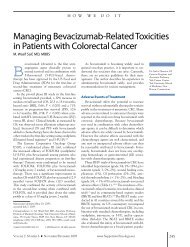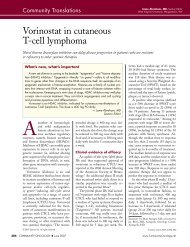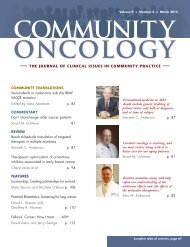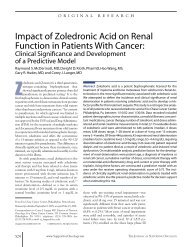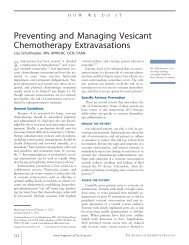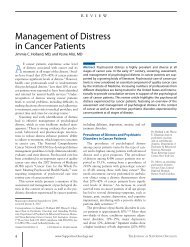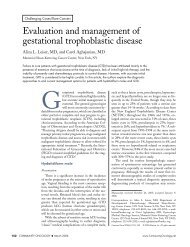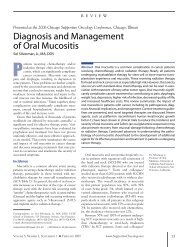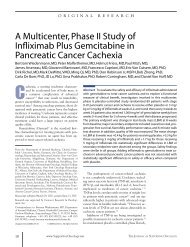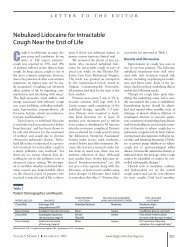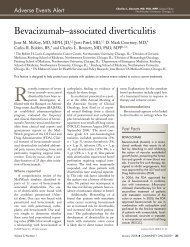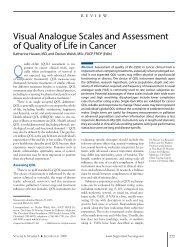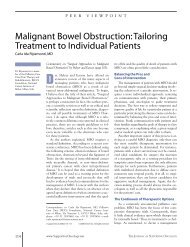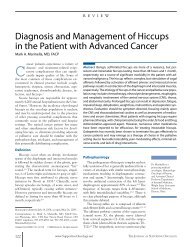Evaluating the “Good Death” Concept from Iranian Bereaved Family
Evaluating the “Good Death” Concept from Iranian Bereaved Family
Evaluating the “Good Death” Concept from Iranian Bereaved Family
Create successful ePaper yourself
Turn your PDF publications into a flip-book with our unique Google optimized e-Paper software.
P E E R V I E W P O I N T<br />
Personality Disorders in <strong>the</strong> Clinical<br />
Setting<br />
Walter F. Baile, MD<br />
Commentary on “Personality Disorders in <strong>the</strong><br />
Oncology Setting” by Meyer et al (page 44)<br />
Although <strong>the</strong> title of this paper suggests<br />
that its main focus is on personality<br />
disorders, it paints a much broader<br />
picture because it discusses aspects of patient<br />
behavior that clinicians often find challenging<br />
to manage. “Difficult patients” often evoke<br />
negative emotions in <strong>the</strong> caregiver or disrupt<br />
<strong>the</strong>ir own continuity of care by refusing<br />
treatment, angry outbursts, or demanding<br />
requests of <strong>the</strong> treatment staff. An important<br />
step not easily achieved is to recognize when it<br />
is <strong>the</strong> stress of illness that is exaggerating<br />
normal traits or when <strong>the</strong> patient has a more<br />
pervasive and lifelong disorder.<br />
In many cases <strong>the</strong> stresses of <strong>the</strong> cancer illness<br />
are responsible for amplification of traits, such as<br />
passivity in <strong>the</strong> person with a dependent personality<br />
or exaggerated attention to details exhibited<br />
by <strong>the</strong> obsessive compulsive personality. Recognition<br />
of <strong>the</strong>se traits can allow <strong>the</strong> clinician to<br />
adjust his or her behavior to <strong>the</strong> patient’s needs.<br />
For example, persons with narcissistic traits (Table<br />
2) may be particularly prone to loss of selfesteem<br />
and depression when <strong>the</strong>y undergo disfig-<br />
Correspondence to: Walter F. Baile, MD, Program in Interpersonal<br />
Communication and Relationship Enhancement,<br />
University of Texas MD Anderson Cancer Center, Houston,<br />
TX 77030; telephone: (713) 745-4116; fax: (713) 794-4236;<br />
e-mail: wbaile@mdanderson.org<br />
J Support Oncol 2011;9:52 © 2011 Published by Elsevier Inc.<br />
doi:10.1016/j.suponc.2011.02.003<br />
uring surgery. Acknowledging <strong>the</strong> challenge <strong>the</strong><br />
illness presents to patients and praising <strong>the</strong>m for<br />
<strong>the</strong>ir perseverance may be a useful strategy. The<br />
authors also point out that it is important for<br />
busy clinicians not to be annoyed with patients<br />
who require more time or patience.<br />
A more serious problem is represented by <strong>the</strong><br />
5%–8% of <strong>the</strong> population affected by a personality<br />
disorder such as antisocial behavior or borderline<br />
personality. These patients are often<br />
challenging in <strong>the</strong> oncology setting because <strong>the</strong>ir<br />
behaviors may be more disruptive than that of<br />
patients with exaggerated personality traits. Acting<br />
out in <strong>the</strong> form of aggressive behavior or<br />
unexpected anger at staff can be particularly<br />
troublesome. In <strong>the</strong> case of <strong>the</strong> borderline disorder,<br />
patients may pit staff against one ano<strong>the</strong>r or<br />
engage in o<strong>the</strong>r behaviors, as outlined by <strong>the</strong><br />
authors (Table 2). In my experience, <strong>the</strong> clinic<br />
and especially <strong>the</strong> inpatient staff have great difficulty<br />
in distinguishing <strong>the</strong>se two situations. Patients<br />
are allowed to seriously act out before help<br />
in managing <strong>the</strong> individual is requested. It is<br />
important to pay attention to clues that might<br />
suggest a more serious disorder. For example,<br />
substance abuse revealed through a patient’s personal<br />
history would be a clue for a borderline or<br />
antisocial personality. When serious disruptive<br />
behavior does occur, early consultation by mental<br />
health professionals can help define <strong>the</strong> diagnosis<br />
and provide management strategies for <strong>the</strong><br />
treatment team and support for <strong>the</strong> staff, who<br />
often feel frustrated with <strong>the</strong>ir ability to manage<br />
such problems.<br />
Dr. Baile is affiliated<br />
with <strong>the</strong> Program in<br />
Interpersonal<br />
Communication and<br />
Relationship<br />
Enhancement at <strong>the</strong><br />
University of Texas MD<br />
Anderson Cancer<br />
Center, Houston,<br />
Texas.<br />
52 www.SupportiveOncology.net THE JOURNAL OF SUPPORTIVE ONCOLOGY



